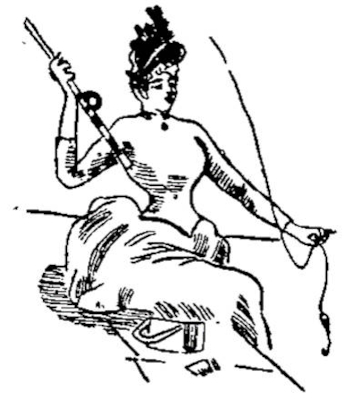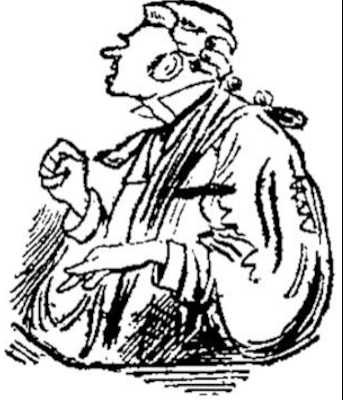This article has been transcribed from a copy of the Cardiff Times in the online collection of scanned Welsh newspapers 1804-1919 in the National Library of Wales, with grateful recognition of the free access accorded to all readers. Paragraph breaks have been introduced for easier reading.
‘What great effects from trifling causes spring?’ This saw is quoted with variants in numerous nineteenth-century works, and is a commonplace. The advice Samuel proffers is equally commonplace, but if today’s reader is coming close to agreeing with some of what Samuel writes, we get a clear reminder of how attitudes have changed: ‘The best course for a man to pursue is never to state what his income really is and then there can be to disappointment and no bickering.’ The husband has ‘made his book’, that is placed his bet, as on a horserace. It was Charles Maurice de Talleyrand-Périgord (1754-1838) French bishop, statesman and diplomat, who said: ‘Speech was given to man to disguise his thoughts’ («La parole a été donnée à l'homme pour dissimuler sa pensée»). (This was incorrectly quoted in no. 86 (4th May 1889) ‘Samuel on “Slang”.’ Alcoholic consumption is a regular topic. When the fictional husband says he has been to his club, we are reminded that after the Sunday Closing Act (applied to public houses in 1881), the number of licensed private clubs in Cardiff rose from 31 to 141 within just five years. Samuel (or his compositor) nearly always writes of drinking Irish whiskey, and not the differently spelt Scotch whisky which is nowadays more commonly available. Samuel ends by quoting the General Confession from the Book of Common Prayer: ‘We have left undone those things which we ought to have done; And we have done those things which we ought not to have done.’ —David Skilton

‘What a stew these domestic rows put me into. Think I’ll disappear for the day and have a spree.’
HOSE lines are those, sir, which say, ‘What great effects from trifling causes spring?’ or something to the same purpose. I always think of those lines in considering domestic differences. A trivial quarrel about some petty matter between husband and wife; subsequently small disputes; a gradual estrangement; consequence – either a cat and dog life or a total separation. It is astounding how very happy a man and woman may be together – if they both only have the mind to be, but when they are both pulling different ways someone is bound to be pulled over, or the rope held between them will totally break. Were I asked what in my view is about the most dangerous period of married life, I should say the time subsequent to the first 12 months and anterior to about the fifth or sixth year.
After 12 months, silly and spoony sentimentalism is usually nauseous to the man – he has begun to get over that, and he has begun to find in the most unpleasant way that he cannot after all curtail his pocket-money, his cigars, and other little bachelor pleasures as easily as he thought he could, and that the society of a wife is not, when all's said and done, such a full and complete compensation for such pleasures as he thought. Moreover, he begins to find out that he has made his book in life and has nothing particular before him but a long and weary stretch of work and struggling, and, above all, he begins to be fully conscious of the fact that the wife he has married is NOT QUITE all he thought her. No matter how much a man loves his wife, this idea always occurs to him at some time or another. Then comes the dangerous period. The same ideas may pervade the woman's mind, and, unless she endeavours by a long course of finesse and delicate management in bringing about that feeling of second love – of renewed love – in which, from hundreds upon hundreds of cases I have seen, I am the most determined believer, it is more than probable that such a couple will lead an unhappy life, either in actually harassing each other or in preserving on both sides a passive sort of hostility.
When a man has been married five or six years (and this is especially the case when a man has been married young), he begins to know better the nature of the woman with whom he has allied himself, and if she be a good woman, who has not endeavoured on her part to widen the comparative coldness between them which has existed since the first 12 months of the union, the second love of which I speak is almost bound to spring verdantly up, and its coming probably means a long period of happiness for both. After the first five or six years a man's active memory as to the little vanities of his bachelorhood is beginning to be dimmed – the flavour of bachelor delights has left his palate; he has probably begun to think that, after all, quiet and the dolce far niente at home are the sweetest methods of keeping a holiday away from business cares, and he generally says to himself in regard to his wife, ‘I didn't make a mistake after all; I'm very happy – and I'll try and keep so.’ In regard to this subject, I would point out how very happy the majority of widowers make their second wives from the very day they marry onwards, and this even in many cases where the same man's conduct as regards his first wife has been by no means unexceptionable. He has begun to realise how happy a man can make the woman who has originally a liking for him by the exercise of discreet kindness and affection.

‘A young man of very striking and classical order of beauty should have no difficulty in picking up an heiress. I'll try that.’
The want of truthfulness and candour is in hundreds of cases a great disturber of domestic peace. The husband or wife who perpetrates some little extravagance which embarrasses his or her means and keeps this a strict secret usually contrives to bring upon himself or herself all manner of petty concealments, lies, and annoyances directed to the hiding-away of the original fault. A husband who is of a boastful nature, and wishes his wife to think the very best of him, is very often tempted to give his wife too exalted an opinion of his income and of his power to obtain money. A greater mistake was never made, for when practical proof is wanting of his power to hand over to her sums which she thinks she is entitled to as a consequence of his exaggerations, the fat is in the fire directly. ‘Where does he spend his money?’ is her question to herself, and then comes the period when she requests him to take any sum he has actually given her to those he spent the rest with.’ The chapter begins with ‘Where do you spend your money, I should like to know? But I'll find out; there's some hussy that gets it, I'll be b[oun]d. My father always paid his way, so there.’ The best course for a man to pursue is never to state what his income really is and then there can be to disappointment and no bickering. A woman will not be content with a very moderate portion if she can get more, so it is better not to make any statement about the matter at all, and when you on occasion turn up very much more than has been expected of you – you will score heavily, take my word for it.

Talk about fishing – can’t this one fish for men! Oh, well, what do you think?
Nearly all domestic unhappiness arises from petty causes. There is very seldom any paltry disputation and nagging in a family when a great crisis arises, for women are desperately plucky, and resign themselves to the inevitable or to a great calamity with a stoical silence and fortitude seldom found in men. Perhaps they feel the more deeply, but they do not generally show it. But when a man refers with mild disparagement to his wife's brother or to the status of her family, it is then that the band strikes up and the concert begins. ‘My people are as good as yours any time, and a lot better,’ the old lady begins, ‘and none of my brothers ever ran away from his wife, but it strikes me that you are all alike. I expect that you'll be going away, too, some time, but don't think I shall run after you; oh no! I should be a deal happier without you. My people, indeed. What did yours ever do for you? That mean old cat of a sister of yours wouldn't lend you ten pounds if you went on your bended knees for it. My people – I wish they'd never seen you,’ and so on and so on.

About the only person – barring mother-in-law – who dare intercept between man and wife.
Candour goes a long way even with the most nattering and irritable woman in the world, and quarrels of a domestic nature can in nine cases out of ten be averted by any man if he only tries. When a man gets home at two a.m. and his wife says with a muffled sneer from the region of the bed-clothes, ‘Of course you've been at business till this time, haven't you? And come staggering home in consequence, eh?’ the best way to reply is by saying, as coherently as the state of your feelings will allow you, ‘I haven't been at business at all; I've been at the club, and I've had a royal ‘Jamboree,' and I've had 12 whiskeys, and I've spent one pound ten and odd, and I shall be very bad in the morning, and – well, what about it?’ If I know anything about it, a sensible woman will accept this statement much more placably and quietly than she would a long and elaborate string of lies about stock-taking, waiting for the Indian mail, very sorry, much exhausted, one glass of whiskey (‘Only one, I ashu' you,’) suddenly overcome, &c., &c., &c.
The merest exercise of mutual forbearance and consideration for the feelings of others quells any number of domestic broils, and when man or woman tries such an exercise it very soon indeed becomes a habit with them, and a life of happiness for both parties is the result. The husband who sets himself to tell his wife ‘her faults,’ and that she is not ‘everybody,’ is an unmitigated ass. The thing is rather to keep those faults in abeyance by strictly steering clear of such causes and subjects as may accentuate them. If silence is golden, as the old saw says, it is never more so than when exercised by the domestic hearth. ‘Speech was given us to conceal our thoughts’ said the cynic – well, it undoubtedly very often is in the home circle. The best or best-natured man or woman in the world has unamiable points in his or her disposition, and these should not be irritated by the blister of a scathing tongue, for the wound lasts longer than unthinking people imagine, and it is long before the scar is healed over. Such is my opinion, based on practical grounds, of domestic differences, of which I have as few as most men – despite an erratic disposition and a demoniacal propensity to do all the things I ought not to do and to leave undone all the things I should do.
Last modified 8 March 2022